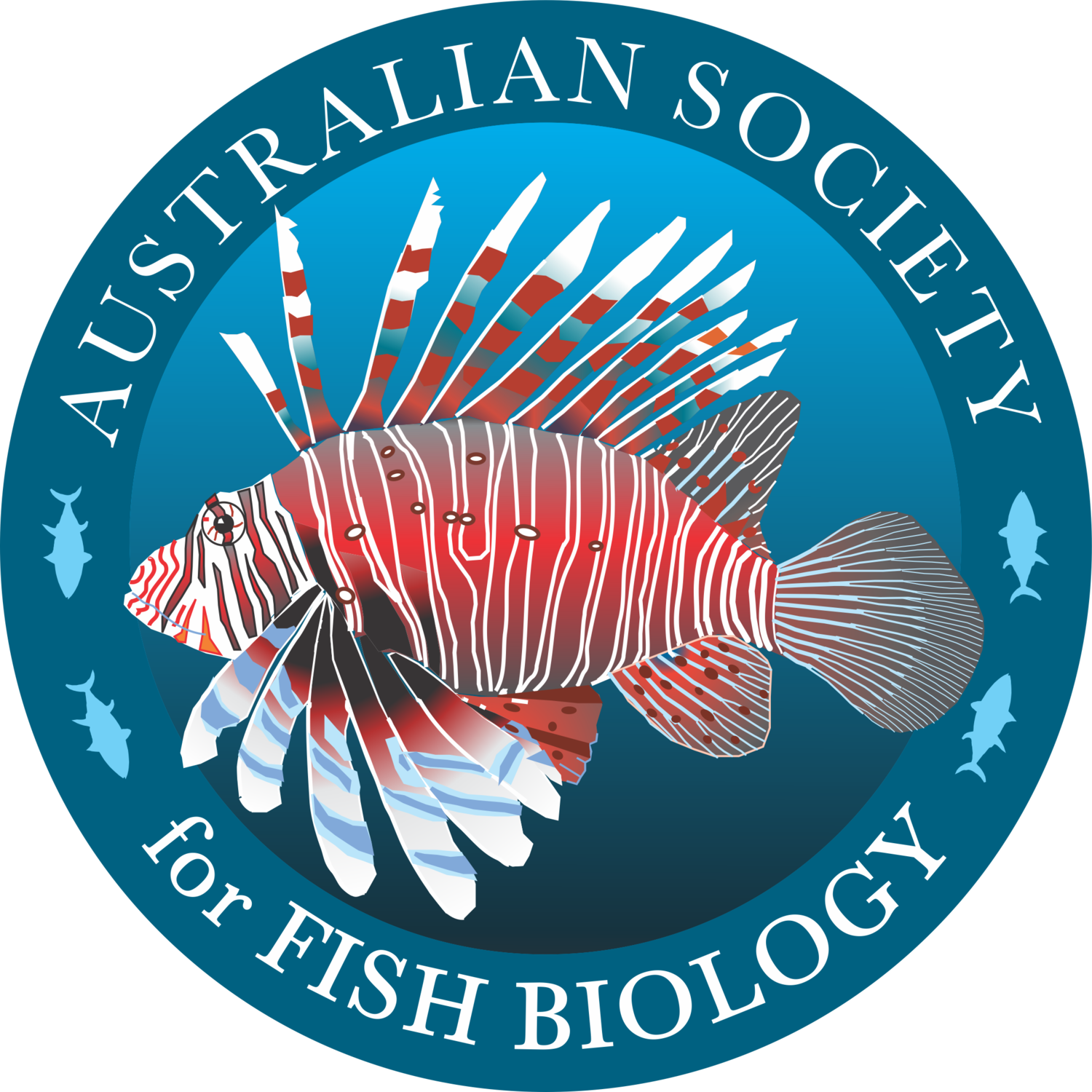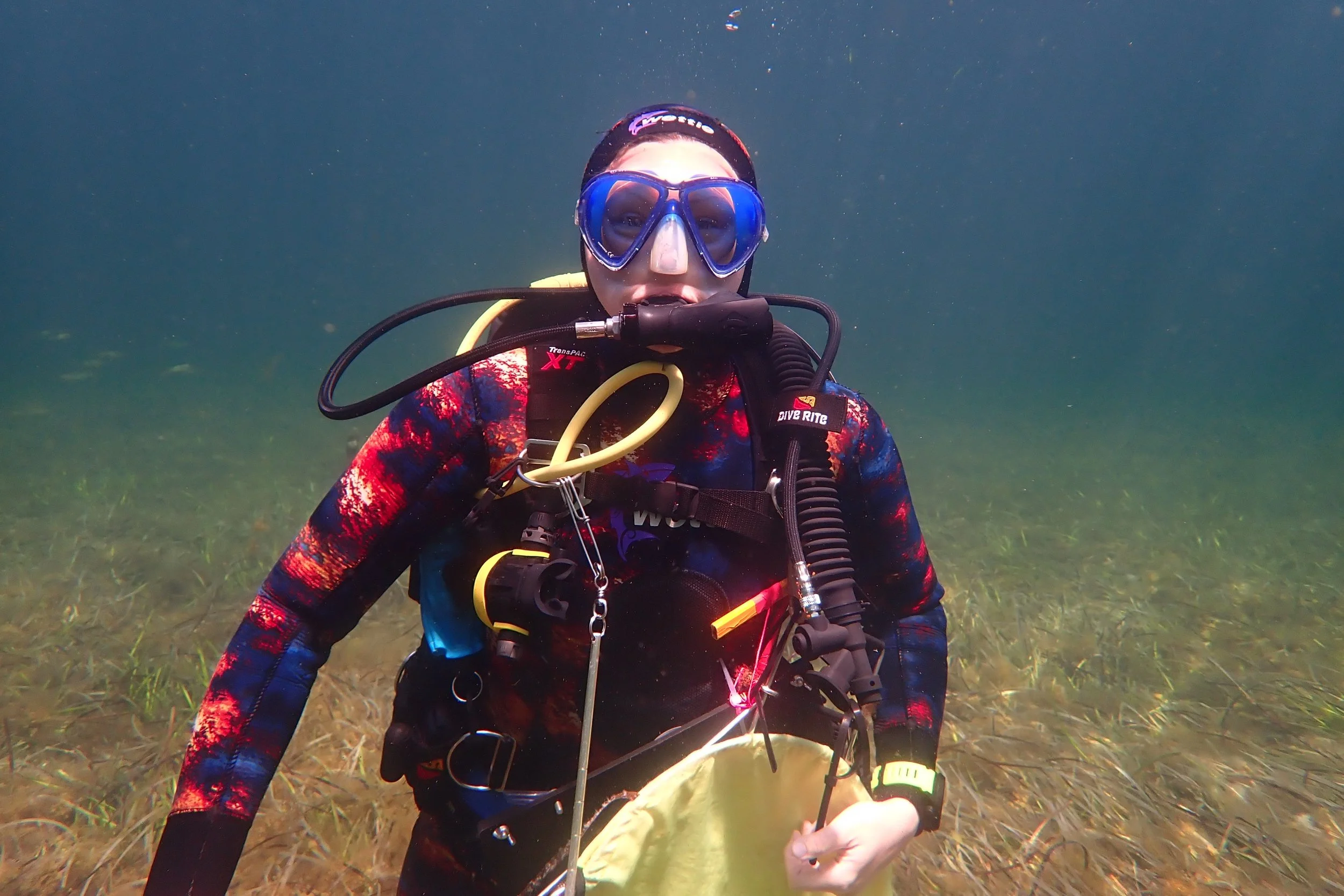Celebrating International Women’s Day
To mark International Women’s Day 2025, we highlight four of ASFB’s amazing state representatives.
We asked each of them about the scientific questions driving their work right now; how they became interested in fish biology and what advice they would give women keen to enter the field; and why it’s important for societies like ASFB to support and celebrate women in science.
Dr Nina Wootton
ASFB Representative for South Australia
Marine Scientist at the University of Adelaide
I’m interested in the connection between people and the marine environment, how marine ecosystems function and how we can better protect them. My work currently focuses on the impacts of plastic pollution and resource use in fisheries and coastal environments.
Right now, I’m working on several interdisciplinary projects, including developing standardised methods for microplastic sampling, assessing plastic use and loss in aquaculture and fisheries and community outreach in remote Indigenous communities.
A big part of my work is making sure research leads to real-world change, so I collaborate closely with industry, government, and Indigenous groups.
I grew up on a farm in western Victoria, so have always loved being outside and connecting with nature. I’ve always been drawn to the ocean, but my interest in fish and marine ecosystems really took off during my undergrad degree when I went on a marine biology study tour to see fish markets and aquaculture systems in China.
I love that marine science is so varied – one day you’re in the field, the next you’re working with policy-makers or running experiments.
For women interested in this field, my advice is to back yourself and get involved. There are so many ways to be a marine scientist, and not all of them involve diving or lab work.
Find good mentors, ask questions, and put your hand up for opportunities.
Societies like ASFB play a crucial role in creating an environment where women can thrive – by creating professional networks, providing mentorship, and advocating for equity in research opportunities and leadership positions.
Representation matters. Having more women in fish biology and marine science brings different perspectives and ways of thinking, which ultimately strengthens the field.
The more we support and celebrate women in science, the more we can inspire the next generation of researchers to follow their passion for understanding and protecting our aquatic ecosystems.
Dr Krystle Keller
ASFB Representative for Australian Capital Territory
Fisheries Scientist at the Department of Agriculture, Fisheries and Forestry (DAFF), Australian Government
My role involves conducting and communicating outputs of scientific research to DAFF and relevant stakeholders, such as the Australian Fisheries Management Authority (AFMA).
This helps inform critical policy and management decisions that underpin the sustainability of Australia’s important fisheries resources.
My primary focus is on how to effectively manage these resources and mitigate impacts on the marine environment to preserve fishery resources for future generations.
From a young age, I knew I wanted to be a marine scientist, inspired by my first family visit to the SeaLife Sydney Aquarium. My fascination with fish grew from that moment, driving my desire to learn about and protect them.
My advice to young women is to follow your dreams, be open-minded and explore all available opportunities.
As a student, I volunteered in the Ichthyology section of the Australian Museum and at the former Oceanworld Manly in Sydney. Since graduating from university, I've worked in various biological fields, from environmental monitoring in the Snowy River, New South Wales, to tracking freshwater fish in the Daly River, Northern Territory.
Fish biology is a diverse field offering numerous opportunities to enhance skills and gain experience, but it requires hard work and commitment.
As a woman in science, I believe celebrating every achievement and milestone is crucial to inspiring women of all ages to consider fish biology as a career.
ASFB is a diverse and inclusive community that supports passionate scientists at every career stage by fostering professional networks and sharing experiences and challenges. This support has been invaluable to me since I joined the society as a PhD student.
Dr Jasmin Martino
ASFB Representative for New South Wales
Research Fellow at UNSW Sydney
I am dedicated to uncovering the biological underpinnings of our aquatic ecosystems and using this knowledge to tackle real-world sustainability challenges.
My research journey has spanned a wide breadth of topics, using innovative chemical and engineering tools to support finfish and octopus fisheries, ensure food traceability, and restore riverine fish passage.
Currently, at UNSW, I am focused on mitigating barriers to riverine fish migration. My research involves both lab experiments with native Australian fish to enhance attraction and safe passage through pipe and open-channel systems, alongside field trials of novel pipe fishways.
It's an interesting mix of discovery and application, paving the way for concrete solutions.
My interest in fish biology stemmed from my love of being in healthy and flourishing natural environments, particularly the ocean. Fish are ubiquitous and key components of these environments, whilst being a critical food source and supporting livelihoods. So there are countless fascinating, hands-on research questions waiting to be tackled.
From aquarium studies to boat and diving adventures, and using coding and modelling skills to untangle mysteries from big data, there's a huge diversity of experiences to delve into.
For women keen to pursue fish biology, I would advise staying curious and dedicated.
Find opportunities to increase your skillset or your understanding, such as volunteering and engaging in hands-on experiences, attending public seminars, and talking to people about their unique career journeys.
"You can’t be what you can’t see." By celebrating women and other diverse groups, ASFB sends a powerful message to young people that there is a place for them here.
Breaking into traditionally male-dominated fields like fisheries and fish biology can seem intimidating, but supportive initiatives help to break down those barriers.
Diversity fosters innovation and enhances our science by incorporating broader perspectives and balancing biases, ultimately strengthening the field of fish biology.
Dr Tanika Shalders
ASFB Representative for Western Australia
Research Scientist at the Department of Biodiversity, Conservation and Attractions (DBCA), Western Australia Government
My scientific questions centre on the impacts of climate change on marine species and ecosystems. I'm most interested in learning how the marine environment is responding to heatwaves and ocean warming.
While I don't personally have the power to stop climate change in its tracks, I can help to find areas of resilience within our marine ecosystems that may benefit future generations.
My interest in fish biology has slowly developed since I was a child. I've always been fascinated with biology, loved animals and practically lived in the ocean. But once I started studying and SCUBA diving there was no going back, I was hooked.
In my opinion, in science - like in nature - a diverse community is better!
Believe in yourself, if you want something, go out and get it. There's never one way to do something, if one door closes barge right through the next until you get to your destination.
There is a saying "you can't be what you can't see".
For this reason the representation of women and nonbinary people in traditionally male dominated fields is extremely important.
By supporting and celebrating these scientists you can create role models who may inspire young women and nonbinary people to get involved in science.
There are many more women leading fish and fisheries science across Australia, deepening our understanding and protecting our aquatic environment. This is something the ASFB proudly supports.
Want to learn more? Check out our post for last year’s International Day of Women and Girls in Science or this post from our 2016 conference about Incredible Women in Ichthyology.





